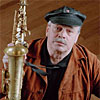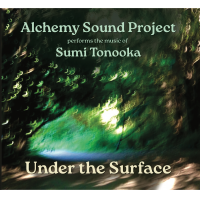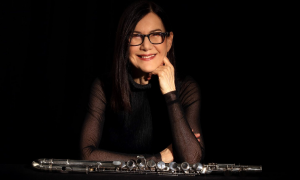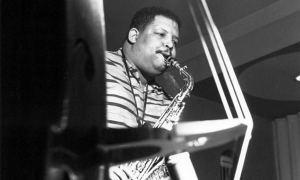Home » Jazz Articles » Interview » Lew Tabackin
Lew Tabackin

Maynard Ferguson
trumpet1928 - 2006

Thad Jones
trumpet1923 - 1986

Mel Lewis
drums1929 - 1990

Joe Henderson
saxophone1937 - 2001

Duke Pearson
piano1932 - 1980

Donald Byrd
trumpet1932 - 2013

Elvin Jones
drums1927 - 2004

Phil Woods
saxophone, alto1931 - 2015

Toshiko Akiyoshi
pianob.1929
All About Jazz: What was your music education background?
Lew Tabackin: I didn't come from a musical family. I grew up in South Philadelphia and the school system loaned instruments and provided a teacher. I wanted a clarinet, but I got a flute. I played it in the orchestra through junior high and high school, won all-state and, as a result, earned a scholarship to go to the Philadelphia Conservatory. I had started playing tenor at 15, but couldn't major in saxophone there. My mind wasn't on flute, I wanted to play jazz saxophone. Finally I got a very good teacher who was first flutist with the Philadelphia Orchestra; he showed me some interesting approaches in how to deal with the instrument.
After I got out of school, I listened mostly to classical flute players, because I was never attracted to "jazz" flute, other than

Frank Wess
saxophone, tenor1922 - 2013
After I got out of the Army in 1965, I moved to New York and started playing around town. [Bassist]

Chuck Israels
bass, acousticb.1936

Bill Evans
piano1929 - 1980

Johnny Mandel
arrangerb.1925
The tenor sax has such a great tradition in jazz but it is difficult to come up with a unique sound. The flute isn't really a primary jazz instrument so I had the freedom to conceive a personal approach that was totally mine. It's not easy to balance the two instruments because they are great enemies. I play tenor pretty physically, then on flute I have to sound like a real flutist. It also helps to create variety in a program. Today's audiences don't get the jokes or have as much of a listening background. I try to balance the program so I don't leave listeners in the dust.
AAJ: How did you meet Toshiko and how did your working relationship develop?
LT: I met Toshiko when I was playing with

Clark Terry
trumpet1920 - 2015

Don Friedman
piano1935 - 2016

Joe Farrell
saxophone1937 - 1986
We married in 1969. By the early '70s it was a difficult time for white jazz musicians in New York City, in the middle of the Black Revolution, which I supported. We couldn't get enough gigs. When I played the Apollo Theatre with Duke Pearson, I wasn't allowed to solo. I had an offer from

Doc Severinsen
trumpetb.1927
Shortly after we moved there, I realized it wasn't the right place for me. I played too hard, they liked bossa novas. It was like Irwin Corey's definition of a fugue: "The music continues, the people go out." I started working on my own stuff. I knew a lot of musicians and learned that the union rehearsal hall was available at a ridiculously low rate, so I suggested that Toshiko put together a band to play her music. I was the contractor and featured soloist.
We rehearsed weekly, even without gigs. We did a concert and made our first record, Kogun (RCA Victor, 1974), in a small studio in Japan.

John Lewis
piano1920 - 2001
Toshiko utilized her heritage in her writing, a lot of it narrative music that told a story. Kogun had a melody that required a certain slide technique on flute, so I had to figure out how to do it. As years progressed, she wrote more of that stuff and it wasn't as hard for me. I had to try to understand and assimilate the Japanese aesthetic, so it became part of my flute playing.
AAJ: How have your musical lives intertwined since Toshiko disbanded the orchestra?
LT: We both have our own concepts, so we have to compromise when playing together. We did a duo tour of Japan in 2008 and recorded two CDs for a small Japanese label [T-Toc]; sometimes we play in a quartet. We're each working on our own music, so we try to balance it out. I practice in the basement, she has a piano upstairs, there's a floor of separation between us. We also have a house in Westchester that has a piano but no phone or TV.
AAJ: Do you have a preference for playing in a small group setting?
LT: I prefer playing with just bass and drums, though I wasn't able to do it too often in the past. I began working on the trio concept in 1967 and it's been my main focus all these years. There is a certain transparency in my trio that you can't get with the presence of a chordal instrument, while omitting piano also makes intimate communication possible. I spend a lot of time with my trio [bassist

Boris Kozlov
bass, acousticb.1967

Mark Taylor
composer / conductorb.1961
AAJ: Do you have a new CD planned or one ready for release?
LT: I put out a trio CD [Live in Paris (Self Produced, 2008)] by myself last year that was recorded for broadcast, just so this band was documented. At this point, I've lost interest in aggressively recording and promoting. Today, young people have all the energy to work their asses off. I'm from the old school, where it was the record company's job to promote. I prefer to spend time working on my music; I'd rather work to get my low B-flat to be better.
Selected Discography
Toshiko Akiyoshi/Lew Tabackin Big Band, Mosaic Select 33 (Mosaic, 2009)
Lew Tabackin Trio, Tanuki's Night Out (Tokuma, 2002)
Toshiko Akiyoshi Jazz Orchestra, Desert Lady/Fantasy (Sony, 1993)
Lew Tabackin Quartet, Desert Lady (Concord, 1989)
Lew Tabackin, Black and Tan Fantasy (Ascent-Discomate, 1979)
Lew Tabackin, Dual Nature (Inner City, 1976)
Tags
lew tabackin
Interview
Ken Dryden
United States
New York
New York City
Maynard Ferguson
Thad Jones
Mel Lewis
Joe Henderson
Duke Pearson
Donald Byrd
Elvin Jones
Phil Woods
Toshiko Akiyoshi
Frank Wess
Chuck Israels
Bill Evans
Johnny Mandel
Clark Terry
Don Friedman
Joe Farrell
Doc Severinsen
John Lewis
Boris Kozlov
Mark Taylor
Comments
PREVIOUS / NEXT
Support All About Jazz
 All About Jazz has been a pillar of jazz since 1995, championing it as an art form and, more importantly, supporting the musicians who make it. Our enduring commitment has made "AAJ" one of the most culturally important websites of its kind, read by hundreds of thousands of fans, musicians and industry figures every month.
All About Jazz has been a pillar of jazz since 1995, championing it as an art form and, more importantly, supporting the musicians who make it. Our enduring commitment has made "AAJ" one of the most culturally important websites of its kind, read by hundreds of thousands of fans, musicians and industry figures every month.
Go Ad Free!
To maintain our platform while developing new means to foster jazz discovery and connectivity, we need your help. You can become a sustaining member for as little as $20 and in return, we'll immediately hide those pesky ads plus provide access to future articles for a full year. This winning combination vastly improves your AAJ experience and allow us to vigorously build on the pioneering work we first started in 1995. So enjoy an ad-free AAJ experience and help us remain a positive beacon for jazz by making a donation today.

New York City
Concert Guide | Venue Guide | Local Businesses
| More...







 Buy Now
Buy Now






















